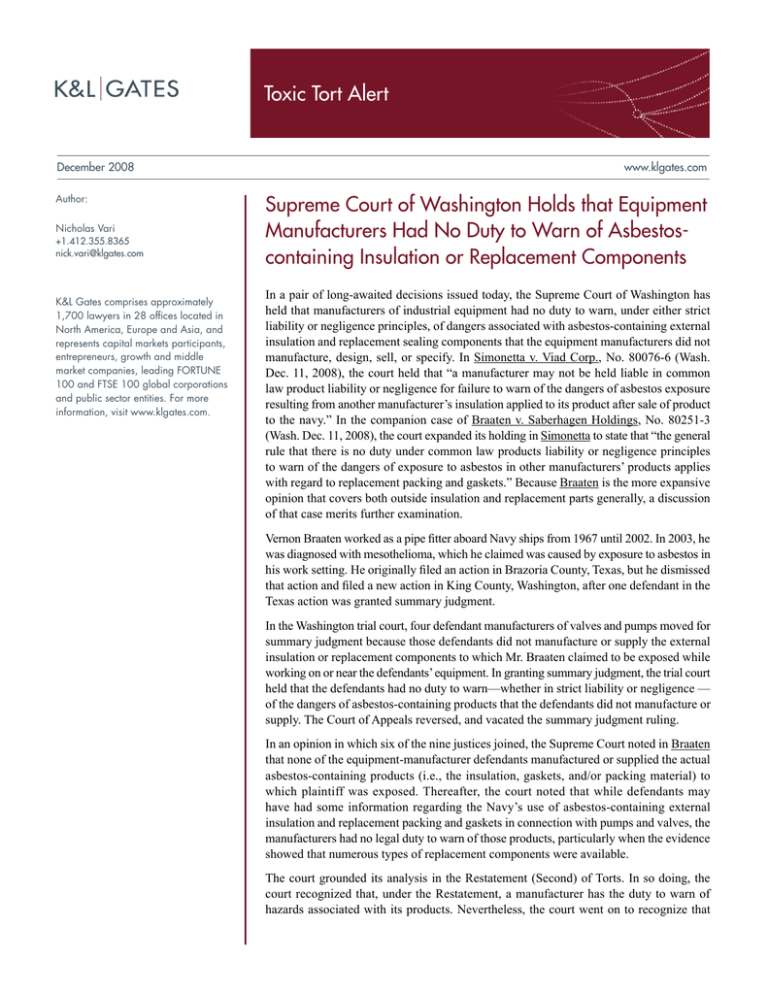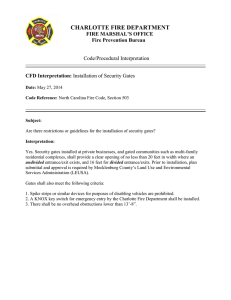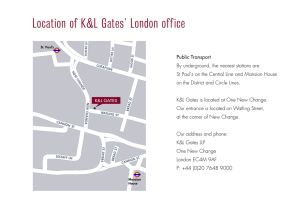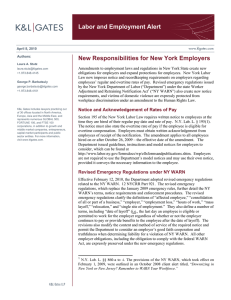
Toxic Tort Alert
December 2008
Author:
Nicholas Vari
+1.412.355.8365
nick.vari@klgates.com
K&L Gates comprises approximately
1,700 lawyers in 28 offices located in
North America, Europe and Asia, and
represents capital markets participants,
entrepreneurs, growth and middle
market companies, leading FORTUNE
100 and FTSE 100 global corporations
and public sector entities. For more
information, visit www.klgates.com.
www.klgates.com
Supreme Court of Washington Holds that Equipment
Manufacturers Had No Duty to Warn of Asbestoscontaining Insulation or Replacement Components
In a pair of long-awaited decisions issued today, the Supreme Court of Washington has
held that manufacturers of industrial equipment had no duty to warn, under either strict
liability or negligence principles, of dangers associated with asbestos-containing external
insulation and replacement sealing components that the equipment manufacturers did not
manufacture, design, sell, or specify. In Simonetta v. Viad Corp., No. 80076-6 (Wash.
Dec. 11, 2008), the court held that “a manufacturer may not be held liable in common
law product liability or negligence for failure to warn of the dangers of asbestos exposure
resulting from another manufacturer’s insulation applied to its product after sale of product
to the navy.” In the companion case of Braaten v. Saberhagen Holdings, No. 80251-3
(Wash. Dec. 11, 2008), the court expanded its holding in Simonetta to state that “the general
rule that there is no duty under common law products liability or negligence principles
to warn of the dangers of exposure to asbestos in other manufacturers’ products applies
with regard to replacement packing and gaskets.” Because Braaten is the more expansive
opinion that covers both outside insulation and replacement parts generally, a discussion
of that case merits further examination.
Vernon Braaten worked as a pipe fitter aboard Navy ships from 1967 until 2002. In 2003, he
was diagnosed with mesothelioma, which he claimed was caused by exposure to asbestos in
his work setting. He originally filed an action in Brazoria County, Texas, but he dismissed
that action and filed a new action in King County, Washington, after one defendant in the
Texas action was granted summary judgment.
In the Washington trial court, four defendant manufacturers of valves and pumps moved for
summary judgment because those defendants did not manufacture or supply the external
insulation or replacement components to which Mr. Braaten claimed to be exposed while
working on or near the defendants’ equipment. In granting summary judgment, the trial court
held that the defendants had no duty to warn—whether in strict liability or negligence —
of the dangers of asbestos-containing products that the defendants did not manufacture or
supply. The Court of Appeals reversed, and vacated the summary judgment ruling.
In an opinion in which six of the nine justices joined, the Supreme Court noted in Braaten
that none of the equipment-manufacturer defendants manufactured or supplied the actual
asbestos-containing products (i.e., the insulation, gaskets, and/or packing material) to
which plaintiff was exposed. Thereafter, the court noted that while defendants may
have had some information regarding the Navy’s use of asbestos-containing external
insulation and replacement packing and gaskets in connection with pumps and valves, the
manufacturers had no legal duty to warn of those products, particularly when the evidence
showed that numerous types of replacement components were available.
The court grounded its analysis in the Restatement (Second) of Torts. In so doing, the
court recognized that, under the Restatement, a manufacturer has the duty to warn of
hazards associated with its products. Nevertheless, the court went on to recognize that
Toxic Tort Alert
“Washington case law does not support extending this
duty to warn [of] another manufacturer’s product.”
Thus, since the defendants’ equipment did not supply
the insulation, gaskets or packing material that
allegedly released the asbestos fibers to which Mr.
Braaten was exposed, those defendants were not
responsible for Mr. Braaten’s injuries.
Washington is the first state supreme court to address
this issue specifically in the asbestos context, although
it notes that its ruling is “in accord with the majority
rule nationwide,” which provides that manufacturers of
equipment have no duty to warn of asbestos-containing
products that the manufacturer did not manufacture
or supply.
K&L Gates comprises approximately 1,700 lawyers in 28 offices located in North America, Europe and Asia, and represents capital markets
participants, entrepreneurs, growth and middle market companies, leading FORTUNE 100 and FTSE 100 global corporations and public sector
entities. For more information, visit www.klgates.com.
K&L Gates comprises multiple affiliated partnerships: a limited liability partnership with the full name K&L Gates LLP qualified in Delaware and
maintaining offices throughout the U.S., in Berlin, in Beijing (K&L Gates LLP Beijing Representative Office), and in Shanghai (K&L Gates LLP Shanghai
Representative Office); a limited liability partnership (also named K&L Gates LLP) incorporated in England and maintaining our London and Paris
offices; a Taiwan general partnership (K&L Gates) which practices from our Taipei office; and a Hong Kong general partnership (K&L Gates,
Solicitors) which practices from our Hong Kong office. K&L Gates maintains appropriate registrations in the jurisdictions in which its offices are
located. A list of the partners in each entity is available for inspection at any K&L Gates office.
This publication is for informational purposes and does not contain or convey legal advice. The information herein should not be used or relied upon
in regard to any particular facts or circumstances without first consulting a lawyer.
©1996-2008 K&L Gates LLP. All Rights Reserved.
December 2008 | 2






